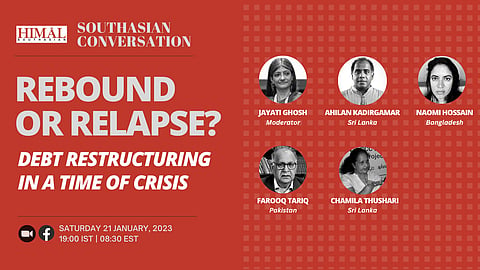Events
Rebound or relapse: Debt restructuring in a time of crisis
A crossborder discussion on economic precarity and the impacts of ongoing debt restructuring processes and negotiations with the IMF in Sri Lanka, Pakistan and Bangladesh.
Over the past year, Sri Lanka has often been cited as a case study in economic precarity, and while headlines have been full of stories of poverty and the ongoing protests, there has been less dedicated coverage over next steps. The UN states that at least 5.7 million people within the country require humanitarian aid. With food inflation reaching 85.6 percent in October, 28 percent of the population face moderate to severe food insecurity.
These events have to be set against a global cost of living crisis; with reports of inflation everywhere from Pakistan to the UK, France, Kenya and Nigeria. As food and fuel prices rise, lower-income countries are disproportionately impacted, and the impacts of debt mismanagement become starkly visible.

